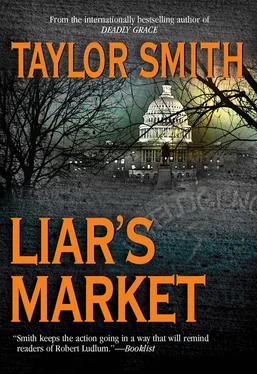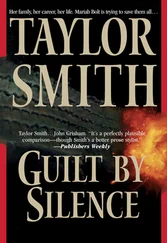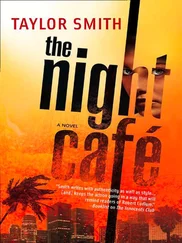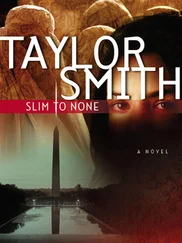The Gunny’s head was shaved in classic Marine style, high and tight, with a circular patch of blond stubble on top waxed to ramrod attention. It made for a slightly pointed skull that seemed a little too small for his thick neck and broad shoulders, but in this, the Gunny was the perfect Jarhead, a well-oiled machine of raw strength and pure military efficiency—a role model for his men.
In the past, the Marine Guard had worn dress uniforms for embassy duty, but with the heightened security climate now, they manned their stations in battle dress, the better to intimidate. The Gunny’s mottled cammies were starched to within an inch of their lives and pressed into razor-sharp creases. His webbed belt and holster cinched tight on his narrow waist, and his pants were tucked into black combat boots that spit-polish gleamed under the recessed overhead lights. His small forehead was permanently pressed into a corrugated line of worry wrinkles as his sharp eyes scanned the bank of monitors before him.
In the marble-floored lobby on the other side of the bullet-proof glass, hundreds of embassy visitors and staff passed each day through security scanners operated by his men. At the front gates, a guard hut stood inside a zigzagged row of concrete barriers erected to thwart any determined terrorist with an explosive-laden vehicle.
The Gunny’s focus zeroed in now on the monitor display of the guard hut out front, where two young Marines were scrutinizing visitor IDs. A car bearing diplomatic plates had just pulled past the concrete barricade and approached the high, wrought-iron embassy gate.
Parking inside the embassy compound was at a premium. Only the ambassador and selected senior diplomatic staff were permitted to drive or be driven inside, along with a very few high-level visitors, such as other ambassadors and representatives from the Foreign Office. Agents from MI-5 and MI-6, the British security and intelligence agencies, had also been showing up ever more frequently in recent months to liaise with their American counterparts.
The Gunny could almost feel the cold drizzle running down his shirt collar as one of his oilskin-jacketed boys bent low, rifles at the ready, to peer into the window of the chauffeur-driven Mercedes, whose tricolor flags fluttered wetly from staffs mounted on the front fenders. This would be the French ambassador, arriving for a private meeting with the visiting delegation of U.S. senators—late, of course, the Gunny thought, snorting lightly. A reception would follow the ambassadorial meeting, and it was scheduled to kick off shortly.
Trust the goddamn Frogs. If they couldn’t even show up on time for a high level meeting, how the hell could you count on them to do their bit in the war on terrorism?
With his attention focused on the action at the front gate, the sergeant failed to hear the footsteps approaching from behind. “Hey there, Gunny. Who do we have here?”
The Marine, to his credit, didn’t flinch.
When Drummond MacNeil peered over his shoulder at the screen, the Gunny noticed a flush rising on the receptionist’s cheeks. Typical. Most of the women in the embassy seemed to hover near MacNeil at internal office get-togethers or follow him with their eyes whenever he passed in the hall. “Gorgeous,” one girl had called him. Amazing how a mysterious job, six feet of lanky slouch, and a pair of blue eyes could turn some perfectly nice girls into total bimbos.
“Looks like the French ambassador, sir,” the Gunny told him.
“Ah, oui, Monsieur Chevalier de la Haye.” MacNeil’s expression was arch, his accent fruity, but it sounded dead-on to the Gunny’s untrained ear. “Fashionably late and ready to make a dramatic entrance, as always, I see.”
“I guess.”
They watched on the monitor as the young Marine at the gate waved the car through.
“Too bad he didn’t just take a miss altogether,” MacNeil added. “I’m sure our visiting dignitaries could do without this guy and his constant whining.”
“Don’t care for our French allies, sir?”
“Avoid ’em as much as I can. My old man used to say, ‘Count on the French to hide behind your back when the shooting starts and to stick a knife in it as soon as victory’s declared.’”
The Gunny glanced up with interest. “Your father served over there during WWII?” MacNeil’s much-decorated father, General Naughton MacNeil, had been a member of the Joint Chiefs of Staff during the early days of Vietnam, so it made sense that the old man would have seen service in the Big One.
MacNeil nodded. “He was with Patton’s Eighth Army in North Africa, then arrived in Paris in time for the liberation. Not that the French ever thanked him for it. He said they drove him nuts when it came to working together in NATO.”
MacNeil stepped back from the monitor and perched his long, lean frame on the corner of a desk near the door, his gaze shifting to the receptionist as she bent low to withdraw some paper from a bottom drawer of her desk, revealing a hint of cleavage and a lacy patch of pink bra. The girl seemed to feel his eyes on her, because she looked up and her face flushed even deeper. She turned back to the window as MacNeil gave the Gunny a sly wink. His suit jacket was unbuttoned, shoulders slouching as his hands slid into the pockets of soft gray pants that even the Gunny could tell were custom-made and must have cost a fortune.
“Your father was a great military leader, sir.”
“Well, he died with his boots on, anyway. Dropped dead of a heart attack while reviewing the troops. All Army, all the way.”
MacNeil didn’t sound too broken up about it, the Gunny thought. Bad blood between them, maybe?
The younger MacNeil was about as different from the General as it was possible to be. Drummond MacNeil was in his late forties, with a thick head of hair that was considerably longer than the Gunny thought appropriate, even for a civilian. It took constant raking to keep the silvery mop from spilling into the man’s perpetually amused eyes. MacNeil always looked like the whole world was walking around with “KICK ME” signs stuck to their backs while he was the only one in on the big yuck.
The Gunny focused on his monitors so MacNeil wouldn’t see his frown of disapproval. The General, by contrast, had been a towering mountain of a man—not a Marine, of course, but pretty damn tough just the same. Once, on a visit to the Pentagon, Jenks had seen the old man’s portrait hanging in a corridor. Built solid, buzz-cut and stern-looking, General MacNeil had radiated leadership. The Gunny would’ve followed that guy into any field of action he named, and so would just about every Marine he knew.
But the son was another kettle of fish. Had never even served in the military, which must have been a real disappointment to the old man. The Gunny had a son himself, and the kid’s first words, swear to God, were Semper Fi. (Of course, Jenks had coached the baby for months, much to his wife’s disgust, but still…) Now six, Connor practically slept in his miniature size cammies and could hardly wait to join the Corps.
MacNeil the younger hadn’t gone the military route, though. Apparently he’d washed out of West Point and avoided the service altogether after that, trading instead on his rep as a Yale man. The Gunny had heard people in a position to know say Drummond MacNeil had done more partying than studying at the Ivy League school. Only the family’s connections had swung his admission and protected a bare “C” average. After spending most of the seventies swanning around beaches, bars, and no-brainer jobs, MacNeil had apparently used those same connections to land himself a job at Langley.
Still, he must have done something right at the Agency, the Gunny conceded, since he’d ended up with this plum London job and, by all reports, was on the fast track to the top. Go figure. Her Majesty’s official diplomatic list identified MacNeil as a trade counselor, but a select few knew he was actually chief of the CIA’s London station.
Читать дальше












